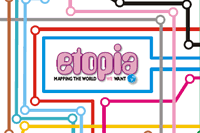What Works Where? Workshop
Etopia | Workshop | Programme | Resources | Past | Present | Future | Etopia E-Journal | World Ecitizens
 12th
- 14th March 2008
12th
- 14th March 2008
Innovative models of ICT CPD programmes for teachers:
the view from the
UK, the US and Eastern Europe.
A two-day free ICT CPD workshop with optional school visit on third day.
See the Programme for full details,
how to apply, and to download a PDF flier.
What is the background to this activity?
MirandaNet is an international e-community of practice that includes researchers, local authority advisors, company trainers, teacher educators or staff trainers. Since 1992 MirandaNetters have been concentrating on publishing programmes, resources and exchanges about digital technologies for the school workforce who are preparing their students for the digital age.
Everyone at the What Works Where? event will be engaged in some way in Information and Communications Technology Continuing Professional Development ( ICT CPD) programme design in schools across national boundaries. The participants will need to understand the underlying model for MirandaNet ICT CPD which is based on a learning process is called work-based research (sometimes also called action research: see Schön, D. (1983). The Reflective Practitioner: how professionals think in action. New York, Basic Books(Pickering, Daly et al. 2007)). Teachers negotiate digital projects relevant to their classroom and institutions, and on supporting those teachers in developing their own e-communities of practice where they can share knowledge and mentor each other. An important aspect of this project is the quality of the stories that teachers tell each other about their struggles and triumphs in mastering the digital challenge. In research terms these stories are called critical incidents. This learning process is enriched by these teacher researchers who work collaboratively to build knowledge in an an e-community of practice (a term invented by Stigler, Lave and Wenger in 1999: Learning and Pedagogy in Communities of Practice in Learners and Pedagogy, Open University). MirandaNetters have developed a theory about how this collaborative knowledge building takes place online in a process that we call Braided Learning. MirandaNet programmes based on these theories and practices are accredited at the MirandaNet Academy at Bath Spa University.
We began this project in February 2007 with our Etopia Workshop in Prague under the umbrella of our charity, World Ecitizens. From this activity the MirandaNet e-journal, Etopia, was developed. The word Etopia plays on the term Utopia ('no place') coined by Sir Thomas More, which in its turn refers to the kind of ideal world described in Plato's Republic. Shakespeare also refers to this kind of idealised world when his heroine, Miranda, in the Tempest says, “Oh, brave new world that hath such people in IT”, and this is the MirandaNet tagline (and where we get our name from). Recently in the UK we have been told to refer to ICT rather than IT, but Shakespeare was of course writing before this change was introduced: who knows what he might have said had he had access to a computer! (See Why Etopia?)
Now we are continuing the Etopian project with the Workshop What Works Where? 12th, 13th March 2008. The aim is to create programmes and resources by teachers for teachers in the US, the Czech Republic and England. On 14th March we will be looking at ICT CPD In Barnfield Academy, Luton to develop more exchanges between countries and cultures as well. The purpose of these exchanges is to explore our own practices through the eyes of others and to enrich what we do through our collaborative efforts.
Places on the workshop are limited. For more information or to register for this event, please contact Manos: and you can also download a PDF Version of the workshop programme.
The Etopian approach: Past, Present and Future:Etopia
The activity for the What Works Where? workshop has been divided into three stages: Past, Present and Future:Etopia
Go to the Resources page for details of the resources available and the essential reading materials for the workshop.
[Back]

